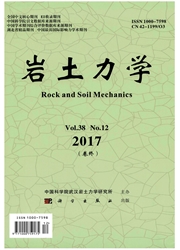

 中文摘要:
中文摘要:
为了揭示污水对水泥土的影响规律,并尝试采用电阻率法作为描述强度和污染特征的手段,把粉质黏土和两种水泥(普通硅酸盐水泥、矿渣硅酸盐水泥)制作的水泥土试块分别浸泡在3种液体(自来水、生活污水、造纸厂污水)中模拟环境侵蚀。首先对比分析了污水对土体液塑限的影响,其次研究了龄期、水泥类型、污水类型等对水泥土抗压强度和电阻率的影响,考察了电阻率和抗压强度的关系。结果表明:污染后土样的液限、塑限均增大,塑性指数减小;水泥土抗压强度和电阻率均随龄期增加而增长;污水均降低了水泥土的抗压强度和电阻率,但是矿渣硅酸盐水泥土的抗压强度和电阻率均高于普通硅酸盐水泥土,说明在污水环境中,矿渣水泥对水泥土有一定的抗劣化能力;在不同的龄期、水泥类型、污水类型下,水泥土电阻率均与抗压强度呈现出一致的变化规律,二者线性相关。
 英文摘要:
英文摘要:
To expose the deterioration rule of cemented soil eroded by sewage, soaking the cemented soil blocks made of two types of cement (ordinary Portland cement, slag Portland cement) and silty clay in three different solutions (tap water, domestic sewage and industrial sewage), the laboratory experiments were conducted. First, the effect of sewage on liquid-plastic limit of soil was described. Second, the influence of curing age, cement type and sewage type on compressive strength and electrical resistivity of cemented soil were discussed. Then, the relationship between electrical resistivity of cemented soil and compressive strength was analyzed. The results show that:After contaminated by sewage, the liquid-plastic limit of soil increases;whereas the plasticity index decreases;the compressive strength and electrical resistivity increase with increasing curing age;the sewage reduces the compressive strength and the resistivity of the cemented soil; however, the compressive strength and electrical resistivity of slag Portland cemented soil are higher than that of the ordinary Portland cemented soil; therefore slag Portland cement can improve the ability of resistance to degradation. Under different curing ages, no matter what type of cement and sewage, the electrical resistivity and compressive strength of the cemented soil vary follow the same rule. The relationship between electrical resistivity and compressive strength is linear.
 同期刊论文项目
同期刊论文项目
 同项目期刊论文
同项目期刊论文
 期刊信息
期刊信息
